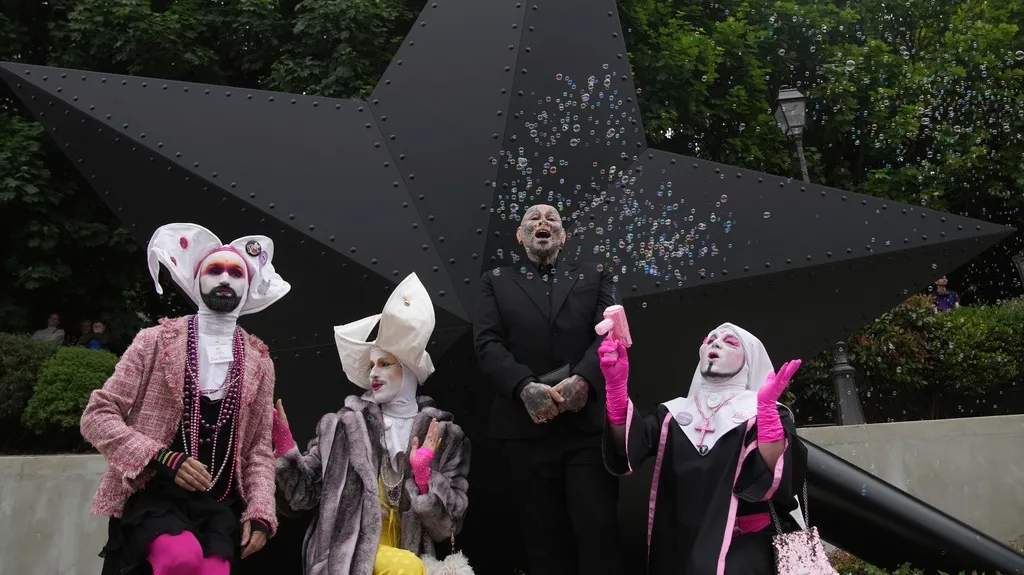December 20, 2012
AIDS Walk to Sever Ties with SFAF
Chris Sosa READ TIME: 5 MIN.
The founder and producer of AIDS Walk San Francisco is severing ties with the San Francisco AIDS Foundation after the 2013 fundraising event.
Craig R. Miller, who began MZA Events 25 years ago, has signed a one-year contract with Project Inform to be the lead agency for the 2014 event, the Bay Area Reporter has learned. He approached leaders of the nonprofit, which does policy advocacy work and runs several help lines for people with HIV and hepatitis C, several months ago with the proposal.
"After much consideration we are honored to accept it," said Project Inform Executive Director Dana Van Gorder. "He took an opportunity to step back and look at where things are in the epidemic and the welfare of AIDS organizations generally and felt that smaller agencies in the community, including Project Inform, need additional support."
Miller told the B.A.R. during a phone interview Tuesday that he had informed officials with the city's largest AIDS nonprofit in 2011 that he felt it was time to transition the walk to a new agency and had wanted to make the break after this year's event. But at the urging of SFAF CEO Neil Giuliano, Miller pushed back the timing by 12 months.
"I think it is incumbent upon all of us to look around from time to time and ask ourselves as AIDS activists what is the best next thing to do," said Miller. "So as my colleagues and I assess the landscape of AIDS organizations in the Bay Area, and assess the needs of people living with HIV and AIDS in the Bay Area as we look ahead two years down the road, our best judgment is a shift of emphasis of the AIDS walk to Project Inform and the large coalition of co-beneficiaries is in order."
Miller will continue to collaborate with SFAF on hosting next year's walk and is promising to make several "great innovations" to freshen up what will be the 27th anniversary of the second-largest AIDS fundraiser in the Bay Area. Organizers estimate that roughly $1.7 million from the 2012 walk, which raised a total of nearly $2.73 million, will be distributed to 46 agencies throughout the region.
Giuliano told the B.A.R. that his agency was "disappointed and surprised" by Miller's decision. Nonetheless, he said SFAF would ensure that the 2013 walk is the "best ever."
"We are very concerned about 2013. Our view is we want to make it the most successful walk we have ever participated in," he said.
But at the same time, SFAF's executive team will be deliberating what actions to take in 2014 to recoup the sizeable hit to its budget that year without the proceeds from the AIDS Walk. The last several years the event has funneled roughly $650,000 to the AIDS foundation's various programs and services.
There is no clause in its contract with MZA Events restricting SFAF from launching its own walk-type event. What sort of additional fundraising event SFAF may create in two years remains undecided. Nor was Giuliano certain if his agency would apply through Project Inform to benefit from the 2014 AIDS walk.
"My board has asked me to take the first six months of 2013 and pull creative minds together and brainstorm and think about how will we replace this lost revenue," said Giuliano.
Since he joined SFAF two years ago this month, Giuliano has focused on the agency's fundraising expenses. He opted to cancel its smaller Seismic Challenge bike ride in November 2011 due to the high cost to produce it compared to the money raised.
He also worked with Miller to reduce the AIDS Walk costs and fees paid to MZA Events.
"I was comfortable in the direction we were heading," Giuliano said. "The cost of producing the event has come down. That is important to us."
Helping smaller nonprofits is stated goal
Since 2007 the amount of money AIDS Walk San Francisco has brought in has dropped in half while expenses have remained relatively the same, according to figures compiled by Project Inform. At the same time SFAF has increased the amount distributed to other agencies, while MZA Events' fee has steadily declined.
Five years ago the event earned $4.66 million with expenses of $1.54 million, or 32 percent of the total raised. Grants then to co-beneficiaries amounted to $96,000, while SFAF maintained $2.4 million, according to figures cited by Project Inform.
By 2011 the amount raised by the walk had dropped to $2.88 million and expenses were pegged at $1.88 million, or 65 percent of the total. Co-beneficiaries received $461,000 and SFAF kept $540,000. MZA earned $198,000 last year, a significant cut from its $242,707 fee in 2010.
This year the event is expected to hit $2.73 million with expenses at $1.52 million, or 55 percent of the total. Partnering agencies will share $517,000, with SFAF expected to receive $698,000. Miller said his fee this year was less than last year, though he did not have the exact figure, and he came in under budget. In June SFAF said the fee paid to MZA this year was $212,000.
"Both the AIDS Walk organizers and the staff of the AIDS foundation are committed to working to improve the cost efficiency of the event," said Miller.
Van Gorder shares the fundraising costs concerns but noted that big events are expensive to produce.
"The last two years or so the overall expenses of the event have come down from a high of $1.8 million to $1.4 million. It is important to continue to do that," said Van Gorder. "Our goal is to improve the cost of fundraising, to look at expenses and also trying to get the revenue back up to where it was in 2007."
SFAF's determination to see the AIDS Walk budget reduced did not play a role in his decision to part ways with the agency, Miller said. Nor did the AIDS foundation's decision to reduce the number of co-beneficiaries this year from about 50 to 35 agencies play into it, he added.
The main motivating factor, he said, was to see more of the money raised be distributed to the smaller AIDS service providers that are affiliated with the event.
"This is not a slight against the San Francisco AIDS Foundation," said Miller. He noted that he has given the agency "abundant time" so that it can "make the most gentle and respectful transition" in 2014.
"Not all relationships last forever. Change is hard but, sometimes, change is necessary and beneficial," said Miller. "We think people will be able to look back on this decision and say the AIDS walk organizers were thoughtful and made the right decision."







